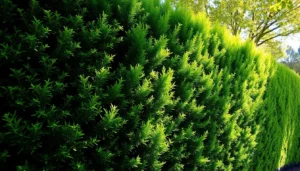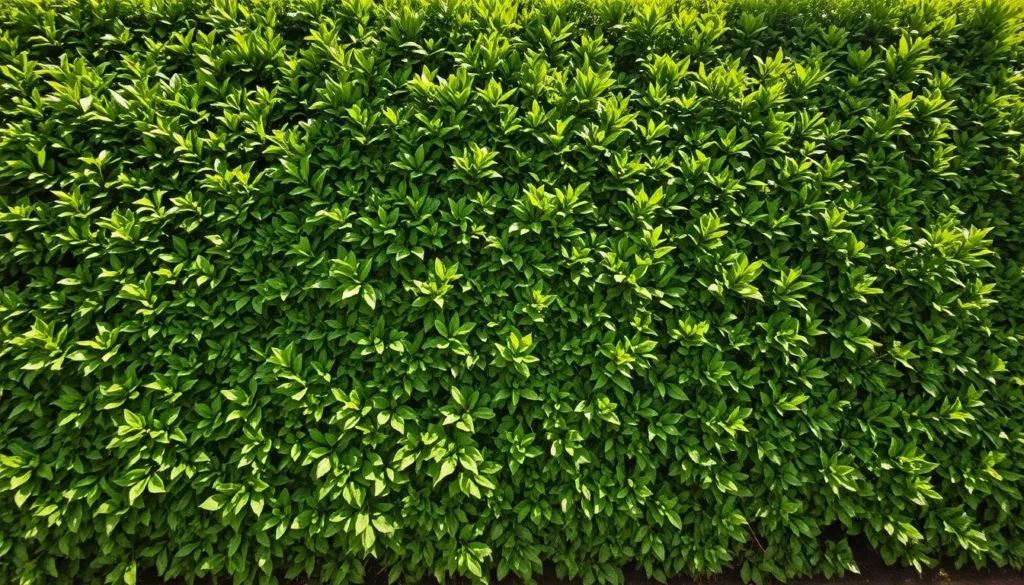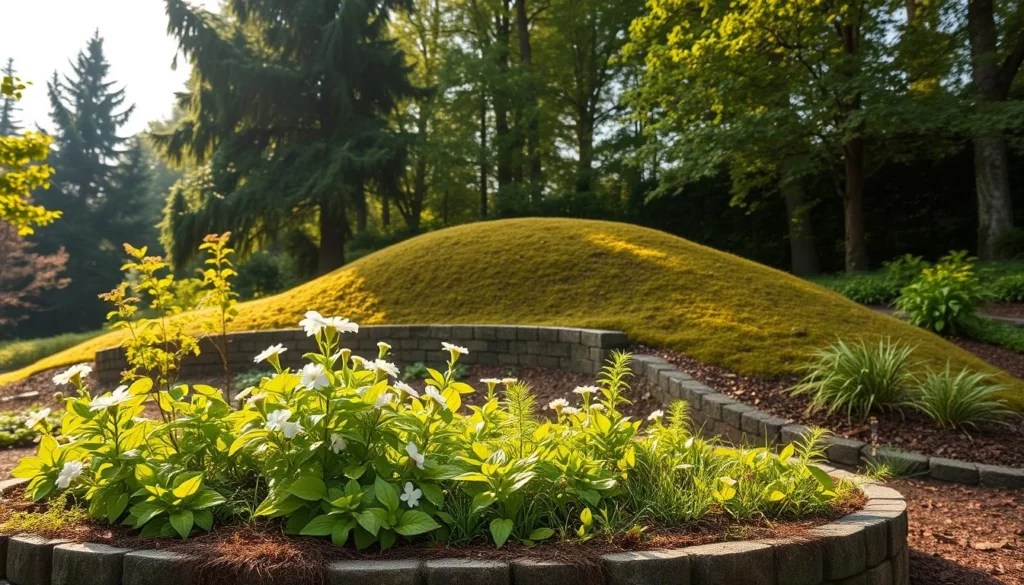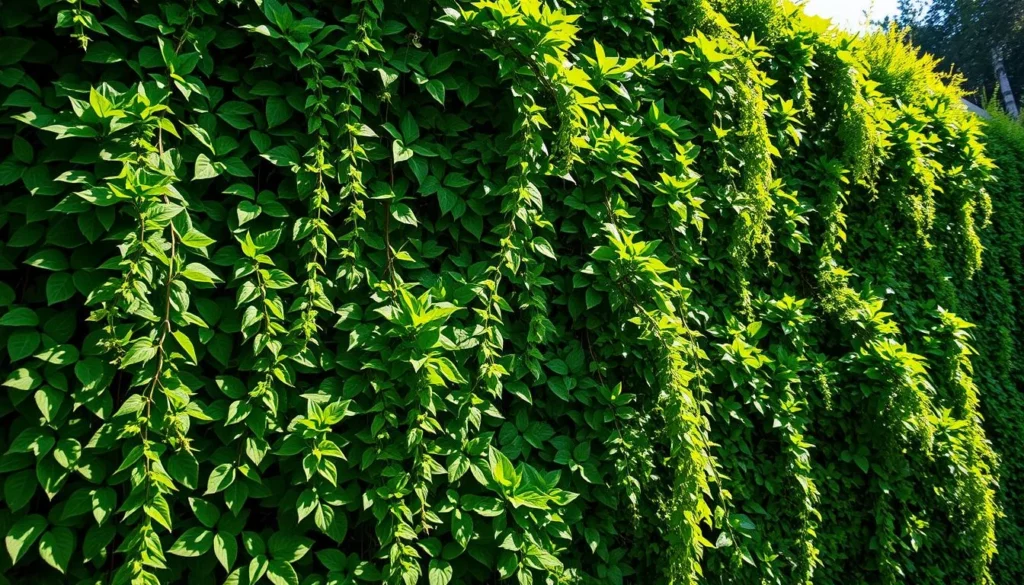Are you tired of the constant noise in your outdoor space? Plant barriers can be a solution to your noise and privacy concerns. Using soundproof hedges can make your property look better and reduce unwanted noise.
Dense hedging can act as a natural sound barrier. It can improve your property’s value and make it more peaceful. In this article, we’ll look at the best hedges for soundproofing. We’ll also talk about what to consider when choosing a hedge and how to design and maintain it.
By the end of this article, you’ll know how to make your outdoor space quieter and more peaceful with soundproof hedges.
Understanding Dense Hedging as a Sound Barrier
Dense hedging can greatly reduce unwanted noise. It involves planting shrubs or trees close together to form a barrier. This barrier not only cuts down on noise but also makes your property look better.
What is Dense Hedging?
Dense hedging means planting shrubs or trees so they grow together, forming a dense barrier. This barrier is great for sound insulation because it absorbs and deflects sound waves. Evergreen hedges are a top choice because they keep their leaves all year, offering constant soundproofing.
How Sound Barriers Work
Sound barriers work by either absorbing or deflecting sound waves. Dense hedging does this through its foliage and structure. The leaves, branches, and trunks absorb sound energy, reducing noise. The dense plants also deflect sound waves, helping to cut down noise.
Benefits of Using Hedges for Soundproofing
Hedges for soundproofing have many benefits. They are a natural and eco-friendly option compared to built barriers. They can be very effective if the right hedge is chosen for the noise problem. Evergreen hedges offer sound insulation all year. Plus, hedges can make your property look better, making them a great all-around solution.
The success of dense hedging as a sound barrier depends on several factors. These include the density of the foliage, the hedge’s height, and the type of plants. By picking the right hedge and keeping it well, you can boost its soundproofing power.
Top 5 Hedges for Effective Soundproofing
Looking for a quieter outdoor space? Start by picking the best hedges for soundproofing. You want plants that can block or absorb sound waves. This will make your outdoor area more peaceful.
The Leyland Cypress, Arborvitae, Boxwood, and Holly are top picks for soundproofing hedges. Each has special traits that help reduce noise.
Leyland Cypress
The Leyland Cypress grows fast and has dense leaves. It’s great for blocking sound and adding privacy. Its tall shape quickly forms a sound-absorbing screen.
Growth Rate: Fast; Maintenance Needs: Moderate; Sound Absorption: High due to dense foliage.
Arborvitae
Arborvitae is loved for its sound-absorbing leaves. It also does well in many climates. This makes it a flexible choice for different areas.
Growth Rate: Medium to Fast; Maintenance Needs: Low to Moderate; Sound Absorption: High.
Boxwood
Boxwood is a timeless hedge choice. It has dense leaves that can be shaped and kept neat. Though it’s not as tall as others, it’s great for sound absorption in smaller spots.
Growth Rate: Slow to Medium; Maintenance Needs: High due to frequent pruning; Sound Absorption: Moderate to High.
Holly
Holly is a strong hedge with dense, spiny leaves. These leaves not only keep people out but also block sound. Holly is a top pick for a natural sound barrier.
Growth Rate: Medium; Maintenance Needs: Moderate; Sound Absorption: High.
When picking a hedge for soundproofing, think about growth rate, upkeep, and sound absorption. The right hedge can greatly cut down on noise. This makes your outdoor space more peaceful.
Factors to Consider When Choosing a Hedge
Choosing the right hedge for soundproofing involves several key factors. The hedge’s ability to block noise depends on its characteristics. You should evaluate these during your selection process.
To make sure your hedge works well as a sound barrier, think about these important factors:
- Height Requirements: The height of your hedge is crucial. Taller hedges block more noise.
- Growth Rate: How fast your hedge grows matters. Faster-growing hedges block noise sooner.
- Leaf Density: The density of your hedge’s leaves is key. Denser foliage blocks more noise.
- Maintenance Needs: The upkeep of your hedge affects its effectiveness. Choose easy-to-maintain hedges.
Height Requirements
The height of your hedge is vital for soundproofing. Taller hedges block more noise. When picking a hedge, think about its mature height and pruning needs.
Growth Rate
The growth rate of your hedge plants is important. Faster-growing plants like Leyland Cypress quickly form a dense hedge. Slower-growing plants take longer to mature.
Leaf Density
The density of your hedge’s leaves is crucial for sound absorption. Hedges with dense foliage, like Arborvitae, block more noise. The leaf structure and density greatly affect sound absorption.
Maintenance Needs
Regular maintenance keeps your hedge healthy and dense. Consider the pruning and maintenance needs of your hedge plants. Some hedges, like Boxwood, need frequent pruning to stay dense.
How to Design Your Hedge for Maximum Soundproofing
To make your hedge soundproof, design is key. A well-planned hedge can block noise, making your outdoor area quieter. It turns your space into a peaceful retreat.
Arranging Hedges for Best Coverage
Plant hedges close together to form a solid wall of green. This tight formation blocks sound better. It’s a smart way to reduce noise effectively.

Layering Techniques
Layering plants of different heights and densities boosts soundproofing. This method not only blocks noise but also makes your garden look better. It adds depth and beauty to your outdoor space.
- Plant taller trees or shrubs towards the noise source.
- Use medium-sized shrubs in the middle layer.
- Incorporate smaller plants or ground cover at the front.
Incorporating Other Plants
Adding other plants can also help soundproof your hedge. Choose plants with thick leaves or lots of growth. They make your hedge even better at blocking sound. Think about using flowering shrubs or climbing plants to fill gaps and add density.
Proper Planting Techniques for Sound Barriers
Creating an effective sound barrier with your hedge requires proper planting techniques. This can greatly reduce noise pollution and make your environment more peaceful. Focus on soil preparation, spacing, and watering to achieve this.
Soil Preparation
Soil preparation is key for a soundproofing hedge. The soil should drain well and be rich in nutrients for plant growth. Adding compost or manure can improve soil quality.
It’s also important to check your soil’s pH level. Most evergreen plants do best in slightly acidic to neutral soil.
Soil testing kits can help you understand your soil’s pH and nutrient levels. Use this information to adjust your soil for the best growing conditions.
Plantation Spacing
Spacing between plants is crucial for sound absorption. If plants are too far apart, sound can pass through. If they’re too close, they may compete for resources. Plant evergreen hedges about 2-3 feet apart for dense growth and sound insulation.
Watering Guidelines
Watering is essential for a healthy hedge. New hedges need consistent moisture, but avoid overwatering. This can cause root rot and other issues. As hedges mature, they become more drought-tolerant but still need regular moisture.
Using a drip irrigation system or soaker hose can help water plants efficiently. This method reduces evaporation and runoff.
Maintenance Tips for Healthy, Dense Hedges
To keep your hedge healthy and dense, you need to care for it regularly. Understanding your hedge’s maintenance needs is key. A dense hedge not only blocks sound but also makes your outdoor area look better.
Pruning Techniques
Pruning is crucial for keeping your hedge dense and in shape. Prune your hedge at least once a year, more often if it grows fast. Use sharp, clean tools to avoid spreading diseases.
For most hedges, prune in late winter or early spring. This encourages new growth.
- Remove dead or damaged branches to keep the hedge healthy.
- Cut back overgrown branches to keep the shape and size right.
- Thin out the center to let air and sunlight in.
Fertilization Schedules
Fertilizing your hedge regularly helps it grow well and absorb sound better. The fertilizer you choose depends on your hedge type. A balanced fertilizer in early spring supports growth.
- Test your soil to see what nutrients it has and its pH level.
- Pick a fertilizer that fits your soil and hedge plant needs.
- Follow the fertilizer’s instructions to avoid overdoing it.
Pest Control Strategies
Pests can harm your hedge and make it less effective at blocking sound. Check your hedge often for pests like aphids or spider mites. Use organic or integrated pest management strategies to control them safely.
- Encourage good insects that eat hedge pests.
- Use neem oil or insecticidal soap for small problems.
- For big problems, get help from a professional.
By following these tips, your hedge will stay healthy, dense, and good at blocking noise. Regular care makes your outdoor space better.
Alternative Soundproofing Solutions
Dense hedging is great for soundproofing, but there are other options too. You can use these options alone or with hedging, depending on what you need.
Fencing Options
Fencing is a popular way to block sound. You can use special materials like mass-loaded vinyl or acoustic panels in your fence. These materials soak up sound, making it quieter.
Key considerations for fencing options:
- Material density: Thicker, denser materials block sound better.
- Fence height: Taller fences work better, but check local rules.
- Installation quality: A well-installed fence is key to its success.
Acoustic Panels
Acoustic panels are great for soundproofing. Place them around your outdoor area to catch sound waves. This reduces echo and noise. Choose panels based on material, size, and where you put them for best results.
Benefits of acoustic panels:
- Customizable: You can find panels in many sizes and materials.
- Effective: They cut down echo and noise well.
- Aesthetic: Panels can match or enhance your outdoor look.
Planting Trees for Additional Barriers
Planting trees is another way to block sound. Trees with thick leaves can stop sound waves. Pick trees that grow big, have lots of leaves, and fit your space well.
Tips for planting trees as sound barriers:
- Choose trees with dense foliage for best sound blocking.
- Plant trees in a staggered pattern for better sound blocking.
- Think about the tree’s size when it’s fully grown to fit your space.
Using these soundproofing options can make your outdoor area quieter. This helps you enjoy your space more.
The Role of Local Climate in Hedge Selection
Local climate conditions are key in picking the best hedge for noise reduction. It’s important to think about how climate affects hedge growth and density.
Cold Hardiness Zones
The cold hardiness zone of your area is crucial when choosing a hedge. Plants vary in their cold tolerance. For example, English Yew and Arborvitae can handle harsh winters well.
| Hedge Type | Cold Hardiness Zone | Soundproofing Effectiveness |
|---|---|---|
| English Yew | Zones 3-7 | High |
| Arborvitae | Zones 3-7 | High |
| Leyland Cypress | Zones 6-10 | Medium to High |
Rainfall and Humidity Considerations
Rainfall and humidity levels affect hedge health and density. Hedges like Leyland Cypress do well in humid conditions. Others need drier air. Knowing your local rainfall helps pick a thriving hedge.
- High Rainfall Areas: Hedges like Leyland Cypress do well in moist conditions.
- Low Rainfall Areas: Choose drought-resistant hedges like some Holly varieties.
Seasonal Variations
Seasonal changes impact hedge density and growth. Some hedges shed leaves in winter, reducing soundproofing. Evergreen hedges like Arborvitae or Holly offer sound barrier all year.
By picking a hedge that fits your local climate, you can boost soundproofing. Consider cold hardiness, rainfall, and seasonal changes. The right hedge ensures effective noise reduction.
DIY vs. Professional Installation of Hedges
Choosing between DIY and professional installation for your evergreen hedge for sound insulation has its pros and cons. Several factors influence your decision.
Pros and Cons of DIY Planting
DIY planting can save money and give you a sense of accomplishment. But, it takes a lot of time and effort, more so if you’re new to gardening. Here are some key points to consider:
- Cost savings on labor
- Personal satisfaction of doing the work yourself
- Flexibility to work at your own pace
- Potential for mistakes without professional guidance
- Time-consuming, more so for larger areas
Before choosing DIY, think about your gardening skills and time. If you’re confident and have enough time, DIY might work for your plant barrier for noise reduction.
When to Hire a Landscape Professional
There are times when hiring a professional is better. For large areas, complex terrains, or specific designs, experts ensure proper planting and efficiency.
Consider a professional if:
- You lack experience in gardening or landscaping
- The area to be covered is large or hard to access
- You need a specific design or pattern for your hedge
- You’re short on time or prefer not to get involved in the physical labor
A professional can also offer advice on the best hedges for your needs, including landscaping for noise control and aesthetics.
Estimated Costs for Installation
The cost of installing a hedge varies. It depends on the area size, plant type, and whether you do it yourself or hire a pro.
| Installation Type | Cost Factors | Estimated Cost Range |
|---|---|---|
| DIY | Plants, soil preparation, tools | $500-$2,000 |
| Professional | Labor, plants, equipment, design | $2,000-$5,000+ |
When planning your hedge installation, remember the initial and ongoing costs. A well-maintained hedge is key for noise reduction and looks.
Common Myths About Hedges and Soundproofing
Many think hedges can’t really cut down on noise. But, hedges have been used for ages to block out sound. With the right plants and care, they can work well.
Hedges vs. Walls: What You Need to Know
Some think hedges are worse than walls for soundproofing. But, hedges have their own strengths. For example, thick leaves can soak up sound, making it quieter. Plus, hedges look better and can make your yard more beautiful.
When deciding between hedges and walls, think about the noise you want to stop. Hedges are great for sounds like car noise because they soak up sound waves. But, for loud sounds like thunder, you might need more than just hedges.
| Feature | Hedges | Walls |
|---|---|---|
| Sound Absorption | Effective for high-frequency sounds | More effective overall, but can reflect sound |
| Aesthetic Appeal | Enhances outdoor beauty | Can be less visually appealing |
| Maintenance | Requires regular pruning and care | Generally low maintenance |
The Truth About Hedge Height and Effectiveness
Some believe hedges must be super tall to block sound. But, height isn’t everything. How thick the hedge is, what plants are used, and how well it’s cared for matter a lot.
A hedge that’s 6 to 8 feet tall can work well. This is true if it’s full of plants like Leyland Cypress or Arborvitae. The hedge needs to be healthy and well-kept to block sound best.
Misconceptions About Hedge Maintenance
Many think keeping a hedge for soundproofing is hard or takes too much time. But, with the right plants and regular care, it’s easy to keep your hedge in top shape.
Pruning keeps your hedge thick and healthy. It also encourages new growth, which helps block sound. Also, using fertilizer and watching for pests keeps your hedge strong.
Knowing the truth about hedges and soundproofing helps you make better choices. Whether you want to block out traffic noise or create a peaceful garden, the right hedge can help a lot.
Conclusion: Create Your Sound Oasis with Dense Hedges
Adding dense hedges to your yard can greatly reduce noise and make it quieter. This simple step can turn your outdoor area into a peaceful retreat. It’s a great way to enjoy your space more.
Key Benefits
Dense hedges act as a natural sound barrier. They block out loud noises, making your yard feel calmer. Choosing the right hedge can make your outdoor space even more serene.
Getting Started
To create your quiet haven, think about the hedge’s height, how fast it grows, and its leaf density. Good planning and upkeep are key to successful landscaping for noise control.
Final Considerations
With the right hedge and care, you can make your yard a peaceful escape. Dense hedges offer both beauty and function, creating a perfect oasis for you to enjoy.




